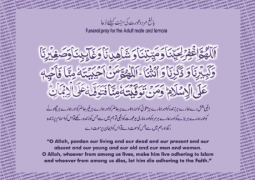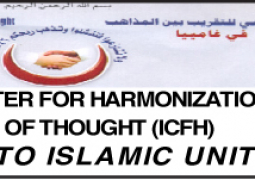
Inna lillahi wa inna ilayhi raji’un” (We belong to Allah and truly to Him we shall Return). A believer should, at the death of a relative or a friend, invoke Allah and say: “Verily we belong to Allah, and truly to Him shall we return.”
The following reports show that to do so is commendable. Ahmad and Muslim reported from Umm Salmah that she said: “I heard the Prophet, peace be upon him, saying: “If a servant of Allah is afflicted with a misfortune and says: Inna lillahi wa inna ilayhi raji’un, Allahumma ajirni fi musibati wa akhlif li khairan minha ‘Verily we belong to Allah and truly to Him shall we return. O Allah! Protect me in this calamity that has befallen me and replace it with something better,’ Allah will accept his prayer, grant him reward for his affliction, and replace it with something better.” She added: “When Abu Salmah (her husband) died, I invoked Allah in the words taught to me by the Prophet, peace be upon him, and Allah did grant me someone better than he, i.e., (He gave me) the Messenger of Allah (as a husband).” Tirmizhi reports from Abu Musa al-Ash’ari that the Prophet, peace be upon him, said: “When a child of a servant of Allah passes away, Allah says to the angels: ‘Did you take the soul of My servant’s child?’ They say: ‘Yes.’ He, the Almighty, says: ‘Did you take away the apple of my servant’s eye?’ They say: ‘Yes.’ He, the Almighty says: ‘What did My servant say at this?’ They say: ‘He praised You and said: “Inna lillahi wa inna ilayhi raji’a un (Verily we belong to Allah and to Him shall we return).” At this Allah says: ‘ Build for My servant a mansion in Paradise and call it the House of Praise (bayt al-hamd)’.” Tirmizhi says this is a sound hadith. Bukhari has reported from Abu Hurairah that the Prophet, peace be upon him, said: “Allah, the Exalted and Glorious says: ‘I have no better reward than Paradise for a believing servant of Mine who is patient and resigned when I take away one of his beloved, one among those he most cherishes in the world.” “Those who say, when afflicted with calamity, ‘To Allah we belong, and to Him is our return,’ are those on whom descend blessings from Allah, and mercy, and they are the ones who receive guidance.” 55 Commenting on these verses of the Qur’an, Ibn Abbas said: “Allah, the Almighty and the Exalted, informs us that when a believer is patient and resigned after a misfortune visits him and invokes Allah, Allah will grant him three (good) merits: blessings, mercy, and guidance to the right path.”
Informing the Deceased’s Family and Friends
The scholars consider it desirable that the deceased’s family, friends, and other good people be informed about his death, so that they may share in the reward of participating in his funeral. It is reported in Sihah Sittah on the authority of Abu Hurairah that the Prophet, peace be upon him, informed his companions about the death of Negus (Najashi), the King of Abyssinia, the day that he passed away. And then the Prophet, peace be upon him, led them to the prayer ground where he lined them up and offered funeral prayer (for him) with four takbirs. Ahmad and Bukhari narrate from Anas that the Prophet, peace be upon him, informed the people about the death of his companions, Zaid, J’afar, and Ibn Rawahah, commanders of the Muslim army in the Battle of Mu’tah, before they received any news from the battlefield. Tirmizhi observes that there is no harm in informing the family and close relations of the deceased person about his death. Al-Baihaqi says he was told that Malik ibn Anas disliked announcing someone’s death at the gates of the mosque, but found nothing wrong with going around inside the mosque to the various groups of students there and informing them of someone’s death. A report, recorded by Ahmad and Tirmizhi on the authority of Huzhaifah, says that Huzhaifah said: “When I pass away, let no one vex me, for I am afraid (my death will be announced) and it may be regarded (as an invitation to) mourning. And I heard that the Prophet, peace be upon him, forbade announcing the death of a person as an invitation to mourning. This refers to a practice of the pre-Islamic period. In those days when a noble died they would send a horseman to various tribes to inform them about his death saying: ‘The people are devastated on account of the death of so and so.’ Such an announcement was (always) accompanied by crying and weeping.”
Weeping Over the Dead Muslim
Scholars are agreed that weeping for the dead is permissible, whereas crying and wailing are not. It is reported in a sound hadith that the Prophet, peace be upon him, said: “Allah does not punish a person for shedding tears or feeling pain in his heart. But He does punish, though he may show mercy, because of (what he utters with) this,” and then he pointed to his tongue. The Prophet, peace be upon him, wept on the death of his son, Ibrahim, and said: “The eyes shed tears and the heart feels pain, but we utter only what pleases our Lord. O Ibrahim! We are aggrieved at your demise.” He also wept when his grand-daughter, Umaymah, daughter of Zainab, died. At this Sa’ad ibn ‘Ubadah said: “O Messenger of Allah! Are you weeping? Did you not forbid Zainab from weeping?” The Prophet, peace be upon him, replied: “This (weeping) is the mercy that Allah has placed in the hearts of His servants. And surely Allah bestows mercy upon those who are merciful among His servants.” A report is transmitted by At-Tabarani on the authority of Abdullah ibn Zaid to the effect that weeping without wailing is permitted. Weeping aloud and wailing cause pain and suffering to the dead person. It is reported from Ibn ‘Umar that when ‘Umar was stabbed and he became unconscious the people around him began crying loudly. When he regained consciousness he said to them: “Don’t you know that the Messenger of Allah said: ‘A dead person is tormented by the wailing of the living’.” Abu Musa reports that when ‘Umar was wounded Suhaib cried: “O my dear brother!” At this ‘Umar said: “O Suhaib! Don’t you know that the Messenger of Allah said: ‘A dead person is tormented by the wailing of the living people’?” Al-Mughirah ibn Sh’ubah reports that he heard the Prophet, peace be upon him, saying: “The one who is wailed for is tortured on account of it.” The above hadith are reported by Bukhari and Muslim. These hadith mean that a dead person feels pain and displeasure when his family wails over him, for he hears their wailing and their deeds are shown to him. This does not mean that the dead are actually punished and tormented because of the wailing of their families for them, because the Qur’an says that a person is not accountable for the actions of others. Ibn Jarir reported from Abu Hurairah that he said: “Your deeds are shown to your dead relatives. So if these are good, they are pleased, and if these are bad, they despise them.” Ahmad and Tirmizhi reported on the authority of Anas that the Prophet, peace be upon him, said: “Your deeds are shown to your dead relatives and kinsfolk. So if these are good they are pleased and if these are bad they say: ‘O Allah! Let them not die until You have guided them to the right path as You guided us before’.” An-N’uman ibn Bashir reports: “Abdullah ibn Rawahah fainted and his sister, ‘Amrah, started wailing: ‘O my monumental loss!’ ‘O, my this and that!’ When he regained consciousness, he said to her: ‘Every time you said something (about me) i was asked, “Are you really what she said?”’.” This is narrated by Bukhari.
To be continue
Read Other Articles In Muslims Hands




